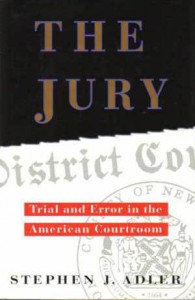 In 1989, the American Bar Association· .. · obtained permission to conduct a study of jurors. They seated 'alternate juries in several cases and then videotaped the deliberations of the alternates, who often were not aware they were not the "real" jury. The ABA committee concluded, after examination of the tapes, that "many jurors were confused, misunderstood the instructions, failed to recall evidence, and suffered enormously from boredom and frustration." One anonymous juror even left behind this note:
In 1989, the American Bar Association· .. · obtained permission to conduct a study of jurors. They seated 'alternate juries in several cases and then videotaped the deliberations of the alternates, who often were not aware they were not the "real" jury. The ABA committee concluded, after examination of the tapes, that "many jurors were confused, misunderstood the instructions, failed to recall evidence, and suffered enormously from boredom and frustration." One anonymous juror even left behind this note: "Oh give me a break, just a ten-minute break,
When I don't have to sit and listen to this shit,
Oh, give me a chance to get up and dance,
For it's such a bore, I long for the door. "
Stephen Adler explores the contradictions in our jury system, which we laud as the best in the 1.)world, 2.) hate the way it works, and 3.) do everything possible to avoid serving. He believes the system is eroding and will soon be changed. Other countries do just fine without juries (Japan and Israel among others). Germany and France have panels of judges. India dropped the jury system it had inherited from Britain, where even now only 1 % of civil trials and 5% of criminal trials are tried before juries.
The jury evolved in America as a subversive mechanism by which the people could thwart the will of the king, " ... to prevent royal decrees from being carried out." But it also served to provide witness that the government's evidence was valid and just: an endorsement of the charges.
The jury's role is to shape history. It is testimony to our faith in democratic ideals that ordinary people are challenged to decide what history will record, e.g., Mike Tyson is a rapist, William Kennedy Smith is not. We deny that right to a professional judiciary that might be subject to the whims of political agendas. Throughout history the power to take life has traditionally belonged to heads of state or their proxies. Our juries have the power to transcend inflexible laws and tailor verdicts to special circumstances. Juries remain awed by the death penalty and its concomitant responsibility. Judges soon see their role as commonplace and routine, not a perspective one would ever like to see applied to the state's fryer of people.












